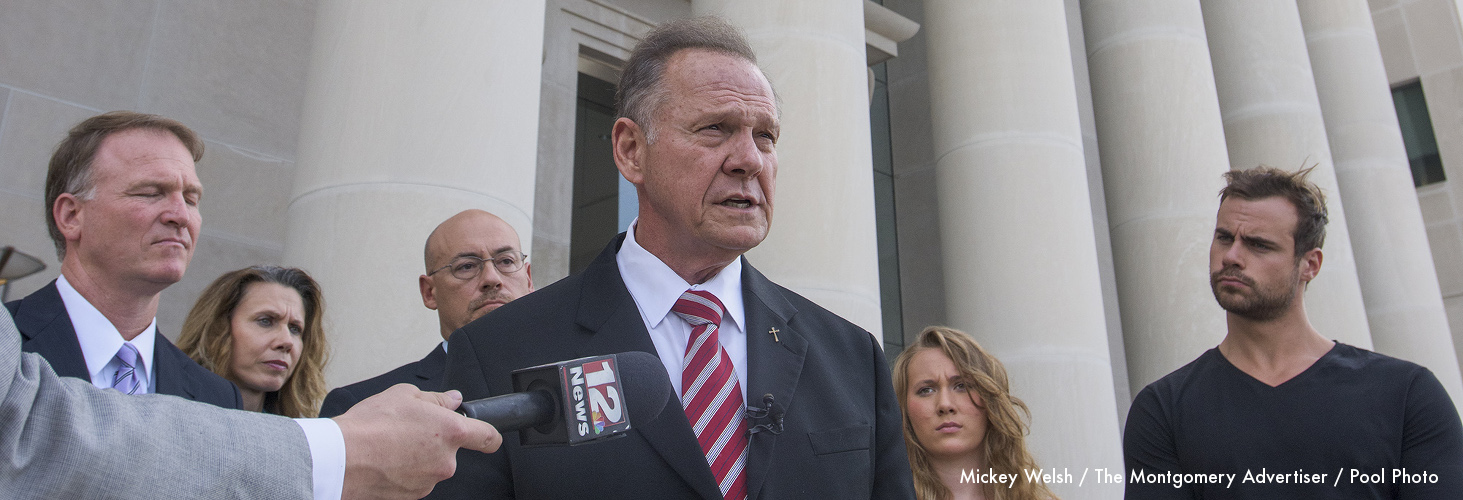By Hannah Ford
You know it’s bad when one of Chief Justice Roy Moore’s harshest critics (apologetically) writes in his defense.
You know it’s bad when Justices refuse to unseal a critical case.
You know it’s bad when the unethical behavior of acting Chief Justice Lyn Stuart and her accomplices have Alabamians worried that they may not receive a fair trial in the State’s highest court.
On Thursday, Governor Robert Bentley and acting Chief Justice Lyn Stuart came together to oversee the drawing of seven retired judges who will hear the appeal of suspended Chief Justice Roy Moore (because everyone knows Bentley and Stuart are totally trustworthy!). Before the eyes of the public and the media, fifty names were drawn at “random” and then the seven who will sit on the Special Court were drawn at random.
It may sound just; but, it’s a jest. The Alabama judiciary’s Triumvirate — Justices Stuart, Bolin and Main — doesn’t care about transparency, impartiality, or accountability any more than they care about Roy Moore. In fact, they’ve slapped it all in the face to get him out and that’s wrong.
A Public Drawing is a Joke When a Relevant Case is Sealed
A sealed case in Alabama politics means trouble and that’s just what one will find in the docket of the Alabama Supreme Court — a case that the Justices have repeatedly refused to unseal. Just what is it that are they so intent on keeping hidden? It’s a May 2016 case entitled Moore v. Judicial Inquiry Commission. Based on the gross bias exhibited in that case, Justices Stuart, Bolin, and Main have been asked to recuse from playing any part in the process of Chief Justice Moore’s appeal; they have defiantly refused to do so. Chief Justice Moore has made multiple requests for the case to be unsealed. The Alabama Political Reporter made a similar motion last week. Until that case is unsealed and the actions of the Triumvirate laid bare before the public, the Justices had no business holding a public “drawing” and we all should recognize it for the laughable hypocrisy that it is.
To Recuse or Not To Recuse, that is not the question
Fact: Lyn Stuart is biased against Chief Justice Moore. When the Judicial Inquiry Commission files charges against a judge — nothing is over. You don’t rearrange things, you don’t clear the office computers, and you don’t move the executive assistant. If you do, you’re partial. When an illegal decision from the Court of the Judiciary is on appeal, you don’t act like it’s over, you don’t fire staff, you don’t ask the judge to clean house and hand over keys, and you don’t change the stationery — unless, of course, you’re blatantly partial.
Fact: Lyn Stuart knows she’s biased. She even signed an Order on October 24 announcing that, due to bias, she’d recuse from sitting on the bench to hear the appeal. With all due respect Justice Stuart: why weren’t you worried about recusing from the sealed case but, careful about recusing in the appeal — even as you sign Orders in the appeal case and oversee the drawing of the appeal judges, after effectively announcing your desired judgment by your actions!?
What is Lyn Stuart doing at the helm of the Alabama judiciary and why aren’t her colleagues holding her accountable? That is the question.
Accountable to No One?
The same Stuart, Bolin and Main (who should be disqualified from anything to do with this appeal) decided that the Special Court would be chosen from a pool of retired Alabama judges — judges unaccountable to the people of Alabama. Will they be fair? Not the point. Justices Parker, Murdock and Wise laudably dissented from this Order, Parker and Wise on the grounds that judges should be chosen from a pool of elected judges, currently accountable to the people of Alabama — especially in this case. The other Justices should’ve listened to Parker’s prudence. However, they chose to continue in their embarrassing charade. It may be that Moore will face yet another unaccountable Court that bows to the elitist sway of corrupted Alabama politics, affirming the decision of that other unaccountable body (the Court of the Judiciary). Or, they may remember that they are indeed accountable – accountable to the rule of law, to the facts, to justice, to the Rules of Professional Conduct and to God.
As for the judicial Triumvirate — they’re accountable to all of that too and if they persist in their misconduct, Alabama should write-in a fair attorney on November 8, in place of Mike Bolin. And, come 2018, Lyn Stuart should be blocked by the Republican Party and defeated by a judge who can at least adhere to basic judicial ethics.
Disagree? It’s okay. Hate Roy Moore and want him “rotting in jail?” You’re free to have intolerant opinions; it’s America. But remember, it’s justice for all — not some and considering the current landscape, Alabama citizens have no reason to expect a fair and impartial trial in the State’s Highest Court. In the American judicial system, the ends aren’t supposed to justify the means and removing a judge over “alleged ethical misconduct” (otherwise known as an opinion) by way of blatant ethical misconduct emanates from the throes of the Star Chamber. It is high time that the Supreme Court Jesters put an immediate halt to their show and take affirmative steps to reclaim their reputation as fair and impartial Supreme Court Justices who “do justice, love mercy, and walk humbly with their God.”
Hannah Ford, is a founder of the Sanctity of Marriage Alabama.



















































